#Louis Bonaparte
Explore tagged Tumblr posts
Text








the bonaparte siblings (requested by anon)
"They were not worried about seeming out of place, they did not fear making mistakes or doing something silly; they had no concern for responsibilities; they had a self-confidence that was not even accompanied by a sense of the duties high position entailed. And this self-confidence sustained them despite everything, and so long as their luck held, it made easy for them things that to others seemed simply impossible. […] The audacity to attempt everything, the certainty of succeeding everywhere— in short, all the attributes of genius, except for genius." — Frédéric Masson
J O S E P H's close bond with the Emperor was often tested throughout their political careers, but never broken. He was without question his closest companion but proved to be more successful as a businessman before and after the Empire.
L U C I E N was never offered a crown or a throne, and broke off from the rest of the family as early as the 1800s. He frequently opposed his brothers' views and notably refused to divorce his wife in favor of a diplomatic alliance. Unlike his siblings, his title was bestowed by the Pope.
E L I S A, contrary to her sisters who primarily held consort roles or acted as strawmen, is believed to be the only Bonaparte sister, and only woman, with actual political powers bestowed by the Emperor. She's the only one of the adult siblings to die before him.
L O U I S' frequent conflicts with the Emperor led Napoléon to annex the Kingdom of Holland in 1810, driving him and his family into exile. Louis would go on to become the father of Napoléon III.
Despite a tumultuous relationship, P A U L I N E was considered Napoléon's favorite sister, and proved to be the most loyal of the imperial siblings, liquidating her assets and visiting him in Elba.
Often regarded as the most influential of the Bonaparte sisters, C A R O L I N E was constantly caught in-between her husband and her brother. She was instrumental in the divorce and remarriage of the Emperor. Her political legacy not only didn't survive the fall of the Empire, but effectively predated it through a series of conflicts with her brother.
J E R O M E was the last sibling standing by 1860, and out of them all was the only one to support the Emperor at Waterloo. He would also be the only one to see the re-creation of the Empire and his nephew on the throne.
#perioddramaedit#historyedit#mine#19th century#*#napoléon bonaparte#jérôme bonaparte#elisa bonaparte#pauline bonaparte#louis bonaparte#lucien bonaparte#caroline bonaparte#joseph bonaparte
353 notes
·
View notes
Text
Do you guys ever wonder why some people in the napoleonic fandom are popular, or even romanticized to the point of being barely recognizable, while others are not? Why some are branded villains, while the same or worse actions from others are somehow ignored or excused?
#been thinking about this#ever since the book on laure junot#but also true for others#marmont#bernadotte#marie louise#louis bonaparte
72 notes
·
View notes
Text
EIGHT SURVIVING CHILDREN OF CARLO AND LETIZIA BONAPARTE, SIBLINGS OF NAPOLEON I 🥺🌟♥️

254 years ago on this day, Napoleon Bonaparte, the first French emperor was born
On the occasion of his birthday, meet the Eight surviving children of Carlo and Letizia Bonaparte, who lived to adulthood
Letizia Bonaparte gave birth to 13 children between 1768 and 1784; five of them died, two at birth and three in their infancy...😥🥀
Among the 13 children, the first child who died was Napoleone Buonaparte, who was born on August 17, 1765 and died on the same day... The last child to die was Jérôme Bonaparte, who died 95 years after his eldest brother...
The registered names of all the children of Carlo and Letizia Bonaparte:
• Napoleone Buonaparte (born and died 17 August 1765)
• Maria Anna Buonaparte (3 January 1767 – 1 January 1768)
• Joseph Bonaparte (7 January 1768 – 28 July 1844)
• Napoleon Bonaparte (Later French emperor) (15 August 1769 – 5 May 1821)
• Maria Anna Buonaparte (14 July 1771 – 23 November 1771)
• A stillborn child (1773)
• Lucien Bonaparte (21 March 1775 – 29 June 1840)
• Maria Anna (Elisa) Bonaparte (3 January 1777 – 7 August 1820)
• Louis Bonaparte (2 September 1778 – 25 July 1846)
• Pauline Bonaparte (20 October 1780 – 9 June 1825)
• Caroline Bonaparte (25 March 1782 – 18 May 1839)
• Jérôme Bonaparte (15 November 1784 – 24 June 1860)
#Carlo Buonaparte#Letizia Bonaparte#Joseph Bonaparte#Napoleon Bonaparte#Lucien Bonaparte#Elisa Bonaparte#Louis Bonaparte#Pauline Bonaparte#Caroline Bonaparte#Jérôme Bonaparte
70 notes
·
View notes
Text


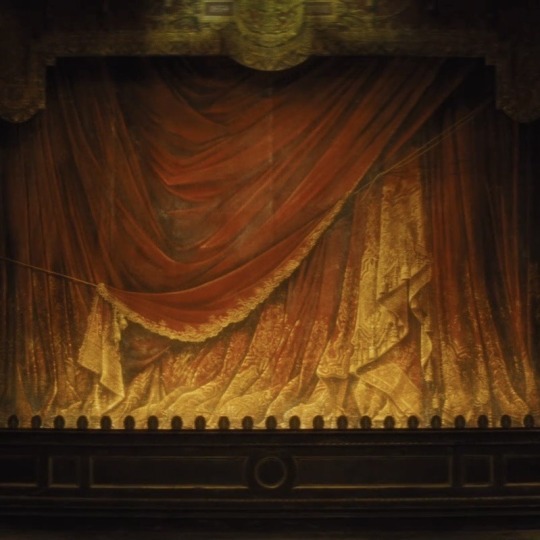


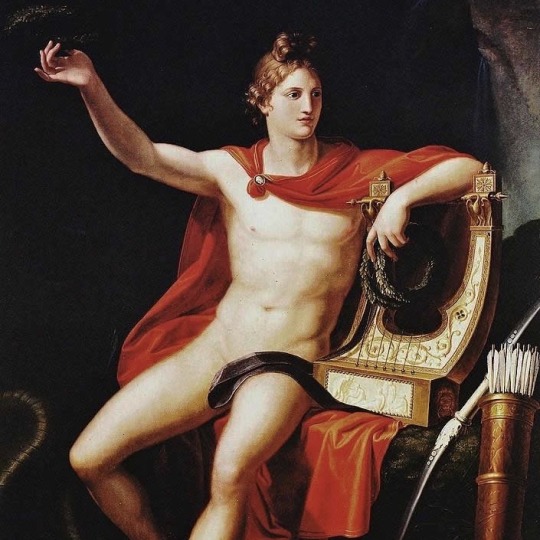
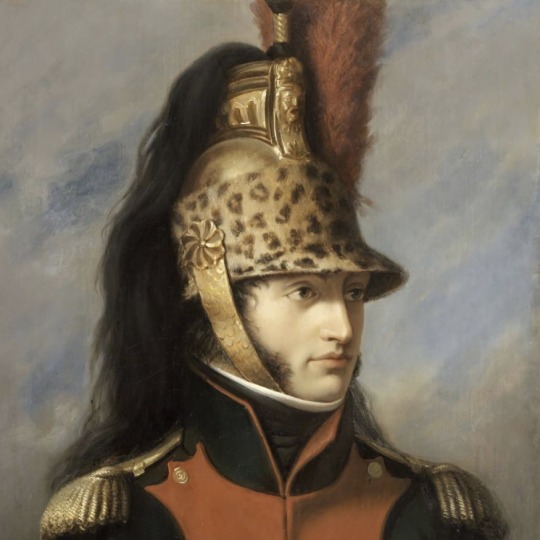


Napoleonic + red
#Napoleon#napoleon bonaparte#edit#red#red edit#paintings#napoleonic era#napoleonic#Louis Bonaparte#first french empire#french empire#19th century#french revolution#history#france#aesthetics#moodboard#mood board
59 notes
·
View notes
Text


Louis Napoleon Bonaparte!
This is napoleon’s brother, Louis.
Napoleon DID not like his brother and gave Louis one job after conquering the Netherlands,
he became the king of the Netherlands.
When Louis announced that he was the king of Netherlands,
Instead of “ik ben jullie koning!” He said, “ik ben jullie konijn!” (Koning is king)
Which meant, rabbit.
14 notes
·
View notes
Text






Royal Birthdays for today, September 2nd:
Marie Josephine of Savoy, Comtesse de Provence, 1753
Louis Bonaparte, King of Holland, 1778
Liliuokalani, Queen of Hawaii, 1838
Louise of Austria, Crown Princess of Saxony, 1870
Elisabeth Marie, Austrian Archduchess, 1883
Miriam, Crown Princess of Bulgaria, 1963
#marie josephine of savoy#louis bonaparte#liliuokalani#elisabeth marie of austria#crown princess miriam#louise of austria#long live the queue#royal birthdays
8 notes
·
View notes
Text
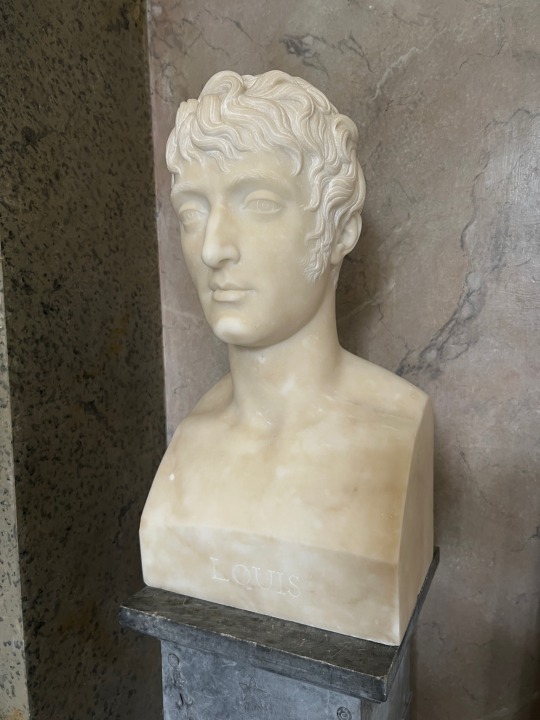
Bust of Louis Bonaparte, taken during my recent visit to Malmaison.
43 notes
·
View notes
Text
MALMAISON MEDIA SALON SOIRÉE 21: THE ACADÉMIE (2012)

1. The Introduction
Welcome, welcome, welcome! Did you miss me?! I missed you too!
Life has been hectic, but I’m back with a review of a book I came across by accident while browsing Goodreads. The setting of Madame Campan’s school isn’t used that much and has a potential, so of course I was interested.
The book itself is seemingly only available for purchase so far. On websites like Amazon that is. I couldn’t find it in the database of archive.org at least. But perhaps someone will upload it in the future.
Anyway, I’m always a sucker for more obscure media, so let’s proceed with the review already!
(Dedicated to @pobodleru and @josefavomjaaga )
2. The Summary
“Eliza Monroe, daughter of a wealthy Virginia lawyer, is sent to France by her family to get a better education fit for a lady.
At the school, she is quickly roped into manipulation games between two bitter enemies: Hortense de Beauharnais and Caroline Bonaparte.
Each of the girls will also experience love, betrayal and many other aspects of growing up.”
Coming of age stories are a classic for a reason, so let’s see how this concept is executed!
(Trigger warning for mentions of physical abuse, murder and suicide.)
3. The Story
First of all, there are too many POVs. Eliza, Caroline and Hortense EACH have their own POV chapters, where they narrate their side of the story in first person.
While this concept of switching between POVs could potentially work, the problem here is that there is too much switching, which gets very annoying and confusing. Basically, too damn much of a good writing device.
Secondly, for a fairly interesting premise, the story doesn’t do squat with it for two thirds of the book. Eliza doesn’t pick sides, characters don’t develop properly and the love subplots don’t get resolved.
For two. Fucking. THIRDS. Of the book!
The conflicts only get sort of resolved in the final third of the book, which, as you can probably imagine, just isn’t enough time to do it properly. And guess what! The author DROPS THE BALL WITH THE RESOLUTION and, as a result, nothing makes sense like she pulled the resolution out of her ass.
Another side effect is that the characters barely change at all over the course of the story, when growing up after facing adversity is the entire point of a coming of age story!
Which brings us to…
4. The Characters
I don’t like Eliza Monroe. The problem isn’t that she is a bratty teenager, by the way. The problem is that she doesn’t change over the course of the story and barely has agency, especially in the beginning.
Hortense and Caroline just play her like a fiddle most of the time, while Eliza herself just waits for something juicy to happen so she can gossip with her mother via letters.
Eliza is just a character blander than unseasoned oatmeal.
Caroline Bonaparte, as usual, is the bad guy. She is a selfish, manipulative cunt who only cares about herself and MAYBE Murat. Then she suddenly speed runs a sort of a redemption arc in the end, and even then it’s ambiguous if it was genuine or not.
Hortense de Beauharnais is supposed to be the good character, depicted by the narrative as better than Caroline in every way and almost beatified by the story.
Unfortunately, this makes her lack depth too and makes it very jarring when she does really shitty things, like trying to drive a wedge between Eugéne and his love interest due to believing that said love interest is unworthy of her brother and should know her place.
She never gets called out on her bullshit either! Our saintly Hortense, Neighbors! Oh, and she has an inappropriate relationship with her stepfather! Or well, implications of such a tryst.
Eugéne is a cinnamon roll personified. At least, until her accidentally kills his love interest, Madeleine. Supposedly, this happens because Madeleine is unstable due to enduring abuse and pining for Eugéne, yet all that happens is that she gets conveniently killed off by Eugéne and we never get to see if she truly was unstable or not. We are TOLD this, but not shown evidence.
By the way, Madeleine had the most potential out of all the important characters. An aspiring biracial actress horribly abused by her jealous, drug-addicted mother and pining for Eugéne, hoping to be rescued like in a fairy tale.
Madeleine is depicted fairly realistically, in my opinion, but then she is suddenly killed off to conveniently resolve the conflict of Josephine not accepting her as a match for Eugéne. No buildup, no significant consequences, ZILCH! Only Eugéne seems shaken by her death, but we aren’t really shown much of this either, merely TOLD.
Josephine, while definitely capable of kindness, has her own selfish bitchy moments, like not giving a fuck that Madeleine died or that Eugéne is shaken up by accidentally killing her. Her own past as a slave owner is also mostly conveniently omitted and she isn’t shown as being called out for it, unlike Eliza, who IS called out for thinking slavery is normal.
Letizia Bonaparte is a scheming snake just like Caroline, almost to cartoonish levels.
Napoleon Bonaparte is a stereotypical shortie, and also almost being a pervert to his stepdaughter. Ewww…
Madame Campan is a stereotypical kind and strict mentor.
So yeah. Most characters don’t feel interesting at all.
5. The Setting
The setting is mostly just mediocre, with occasional common cliches like claiming Robespierre REIGNED in France or that nobility during Frev was automatically in danger. But these are far from the worst offenders, so eh.
The descriptions are surprisingly good though, in that they are integrated into the book in a balanced way, so here at least one win for the author!
6. The Writing
Problems with the writing start WITH THE TITLE. More specifically, combining French spelling of a noun with an English article. “THE ACADÉMIE”, “THE TERREUR”, etc.
It’s unjustified and clunky at best. At worst, it looks like the author is just throwing in French words because the book is set in France. I would understand if it was a foreign character trying to show off and making these weird mistakes, but ALL CHARACTERS speak like that!
It’s… definitely an odd choice.
Other than that, however, a bit of props to the author for at least trying to write realistic bratty teenagers.
7. The Conclusion
Honestly, this book isn’t the worst I’ve ever seen. Not by a long shot. However, I would still recommend to give it a hard pass. It’s not bad. Not even so bad that it’s funny. And not even rage inducing.
Just… meh. Bland. Nothing to write home about.
On that note, I declare this Soirée at the Malmaison Media Salon as finished. Hope you stay tuned for more future reviews though!
Love,
Citizen Green Pixel
#eliza monroe#caroline bonaparte#hortense de beauharnais#louis bonaparte#napoleon bonaparte#josephine bonaparte#letizia bonaparte#madame campan#malmaison media salon#the académie
5 notes
·
View notes
Text
Happy birthday Louis Bonaparte! September 2, 1778

Brother of Napoleon, father of Napoleon III
19 notes
·
View notes
Text

Louis🌸
15 notes
·
View notes
Text
“Let the dead bury their dead, for thus only can it discover its own true meaning.”
— Karl Marx, The Eighteenth Brumaire of Louis Bonaparte
#Karl Marx#The Eighteenth Brumaire of Louis Bonaparte#Louis Bonaparte#Brumaire#18 brumaire#18th brumaire#18th brumaire of Louis Bonaparte#Marx#quotes#German literature#literature#1800s
1 note
·
View note
Text
Whether it was a question of the right of petition or the tax on wine, freedom of the press or free trade, the clubs or the municipal charter, protection of personal liberty or regulation of the state budget, the watchword constantly recurs, the theme remains always the same, the verdict is ever ready and invariably reads: “Socialism!” Even bourgeois liberalism is declared socialistic, bourgeois enlightenment socialistic, bourgeois financial reform socialistic. It was socialistic to build a railway where a canal already existed, and it was socialistic to defend oneself with a cane when one was attacked with a rapier.
This was not merely a figure of speech, fashion, or party tactics. The bourgeoisie had a true insight into the fact that all the weapons it had forged against feudalism turned their points against itself, that all the means of education it had produced rebelled against its own civilization, that all the gods it had created had fallen away from it. It understood that all the so-called bourgeois liberties and organs of progress attacked and menaced its class rule at its social foundation and its political summit simultaneously, and had therefore become “socialistic.” In this menace and this attack it rightly discerned the secret of socialism, whose import and tendency it judges more correctly than so-called socialism knows how to judge itself; the latter can, accordingly, not comprehend why the bourgeoisie callously hardens its heart against it, whether it sentimentally bewails the sufferings of mankind, or in Christian spirit prophesies the millennium and universal brotherly love, or in humanistic style twaddles about mind, education, and freedom, or in doctrinaire fashion invents a system for the conciliation and welfare of all classes. What the bourgeoisie did not grasp, however, was the logical conclusion that its own parliamentary regime, its political rule in general, was now also bound to meet with the general verdict of condemnation as being socialistic. As long as the rule of the bourgeois class had not been completely organized, as long as it had not acquired its pure political expression, the antagonism of the other classes likewise could not appear in its pure form, and where it did appear could not take the dangerous turn that transforms every struggle against the state power into a struggle against capital…
Thus by now stigmatizing as “socialistic” what it had previously extolled as “liberal,” the bourgeoisie confesses that its own interests dictate that it should be delivered from the danger of its own rule; that to restore tranquillity in the country its bourgeois parliament must, first of all, be given its quietus; that to preserve its social power intact its political power must be broken; that the individual bourgeois can continue to exploit the other classes and to enjoy undisturbed property, family, religion, and order only on condition that their class be condemned along with the other classes to like political nullity; that in order to save its purse it must forfeit the crown, and the sword that is to safeguard it must at the same time be hung over its own head as a sword of Damocles." -Karl Marx, The Eighteenth Brumaire of Louis Bonaparte, 1852
2 notes
·
View notes
Text
youtube
7 notes
·
View notes
Text
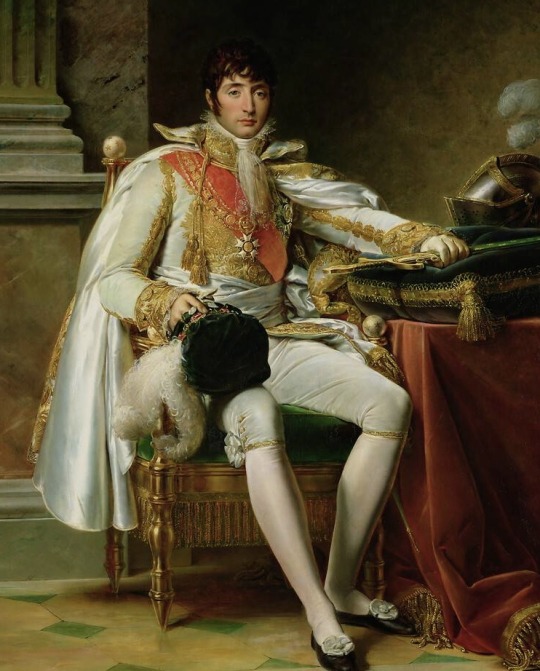
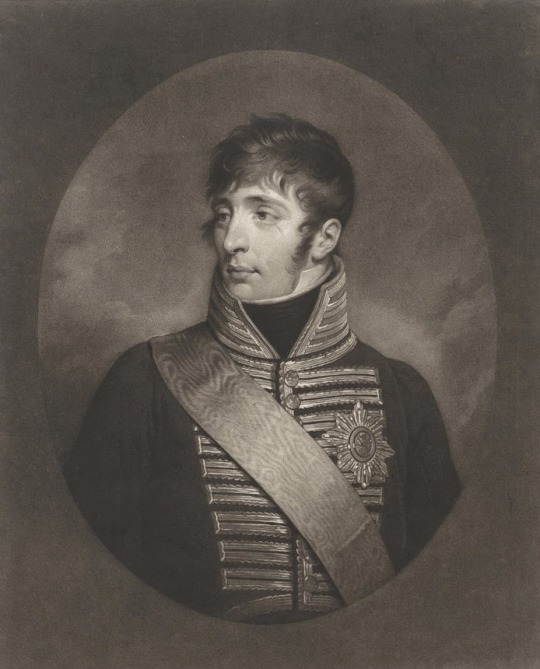
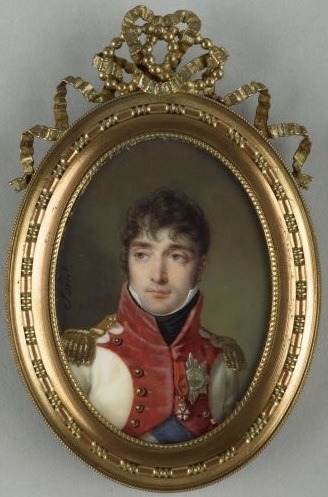



Louis Bonaparte appreciation post
#Louis#Louis Bonaparte#Napoleon’s brother#art#portrait#Napoleon#19th century#early 19th century#Napoleon’s family#first french empire#napoleonic era#french empire#napoleonic#french#France#men’s fashion#history of fashion#napoleon bonaparte#Napoleon’s brothers#1800s#1810s#1800s fashion#regency#the wallace collection#1800s art#paintings#neoclassical#rococo#baroque#neoclassicism
101 notes
·
View notes
Text
Napoleon crossing the Alps : different perspectives
(but mostly riding a tired donkey)






185 notes
·
View notes
Text
I thank my good and most excellent mother, the Cardinal, my brothers, Joseph, Lucien, Jerome, Pauline, Caroline, Julie, Hortense, Catarine, Eugene, for the interest they have continued to feel for me. I pardon Louis for the libel he published in 1820: it is replete with false assertions and falsified documents.
Napoleon leaving Louis out of the list of family members he thanks in his will, but including Caroline, is fascinating to me. I’d love to find out if she ever wrote to him on St Helena; it sounds like she must have, if he’s saying she’s one of the ones who “continued to feel interest” for him.
I doubt he ever wrote to her, though, and if he did, Metternich’s agents probably would’ve made sure she never received any letters from him anyway.
(The details of Napoleon’s will are here.)
51 notes
·
View notes